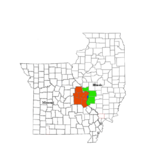Lebanon, Illinois
Lebanon, Illinois | |
|---|---|
 | |
 Location of Lebanon in St. Clair County, Illinois. | |
| Coordinates: 38°36′12″N 89°48′41″W / 38.60333°N 89.81139°W | |
| Country | |
| State | |
| County | St. Clair |
| Area | |
• Total | 2.70 sq mi (7.00 km2) |
| • Land | 2.69 sq mi (6.98 km2) |
| • Water | 0.01 sq mi (0.02 km2) |
| Elevation | 459 ft (140 m) |
| Population (2020) | |
• Total | 4,691 |
| • Density | 1,740.63/sq mi (672.09/km2) |
| Time zone | UTC-6 (CST) |
| • Summer (DST) | UTC-5 (CDT) |
| ZIP Code(s) | 62254 |
| Area code | 618 |
| FIPS code | 17-42496 |
| GNIS feature ID | 2395663[2] |
| Wikimedia Commons | Lebanon, Illinois |
| Website | www |
Lebanon is a city in St. Clair County, Illinois, United States. The population was 4,691 at the 2020 census It is a part of the Metro East region of the Greater St. Louis metropolitan area. Lebanon is home to McKendree University, the oldest college in Illinois.
Geography
[edit]According to the 2010 census, Lebanon has a total area of 2.474 square miles (6.41 km2), of which 2.46 square miles (6.37 km2) (or 99.43%) is land and 0.014 square miles (0.04 km2) (or 0.57%) is water.[3]
Demographics
[edit]| Census | Pop. | Note | %± |
|---|---|---|---|
| 1860 | 1,691 | — | |
| 1870 | 2,117 | 25.2% | |
| 1880 | 1,924 | −9.1% | |
| 1890 | 1,636 | −15.0% | |
| 1900 | 1,812 | 10.8% | |
| 1910 | 1,907 | 5.2% | |
| 1920 | 1,883 | −1.3% | |
| 1930 | 1,828 | −2.9% | |
| 1940 | 1,867 | 2.1% | |
| 1950 | 2,417 | 29.5% | |
| 1960 | 2,863 | 18.5% | |
| 1970 | 3,564 | 24.5% | |
| 1980 | 3,245 | −9.0% | |
| 1990 | 3,688 | 13.7% | |
| 2000 | 3,523 | −4.5% | |
| 2010 | 4,418 | 25.4% | |
| 2020 | 4,691 | 6.2% | |
| U.S. Decennial Census[4] | |||
As of the census[5] of 2010, there were 5,523 people, 1,275 households, and 804 families residing in the city. The population density was 1,641.4 inhabitants per square mile (633.7/km2). There were 1,389 housing units at an average density of 647.2 per square mile (249.9/km2). The racial makeup of the city was 78.46% White, 18.45% African American, 0.34% Native American, 0.48% Asian, 0.09% Pacific Islander, 0.40% from other races, and 1.79% from two or more races. Hispanic or Latino of any race were 1.53% of the population.
There were 1,275 households, out of which 28.8% had children under the age of 18 living with them, 48.2% were married couples living together, 11.5% had a female householder with no husband present, and 36.9% were non-families. 28.5% of all households were made up of individuals, and 12.9% had someone living alone who was 65 years of age or older. The average household size was 2.41 and the average family size was 2.98.
In the city, the population was spread out, with 20.8% under the age of 18, 18.6% from 18 to 24, 22.9% from 25 to 44, 21.0% from 45 to 64, and 16.7% who were 65 years of age or older. The median age was 36 years. For every 100 females, there were 84.7 males. For every 100 females age 18 and over, there were 80.8 males.
The median income for a household in the city was $37,042, and the median income for a family was $48,711. Males had a median income of $30,597 versus $21,341 for females. The per capita income for the city was $17,125. About 9.8% of families and 13.4% of the population were below the poverty line, including 14.2% of those under age 18 and 7.1% of those age 65 or over.
Arts and culture
[edit]Registered historic places include:
Education
[edit]Lebanon is home to the oldest founded college in the state of Illinois, McKendree University, and is also home to Lebanon Grade School And Lebanon High School (home of the Greyhounds).
Media
[edit]The Lebanon Advertiser has operated since 1911.[6]
Notable people
[edit]- Christine Brewer, Grammy Award-winning operatic/classical singer, graduate of McKendree University, has resided in Lebanon, Illinois for many years
- Ed Busch, MLB shortstop for St. Louis Browns and Philadelphia Phillies
- Bill Cofield, former University of Wisconsin basketball head coach, graduate of McKendree University
- Mark Consuelos, daytime soap actor, known for playing Mateo Santos on All My Children, and Hiram Lodge on Riverdale. Married to Kelly Ripa and, since 2023, co-hosts with his wife the morning talkshow Live with Kelly and Mark
- Neal Cotts, relief pitcher for 2005 World Series champion Chicago White Sox, also for Minnesota Twins, Milwaukee Brewers, Texas Rangers, Oakland Athletics, Chicago Cubs
- Craig Virgin, two-time world cross-country champion, nine-time Big Ten champion and three-time Olympian in track and field
References
[edit]- ^ "2020 U.S. Gazetteer Files". United States Census Bureau. Retrieved March 15, 2022.
- ^ a b U.S. Geological Survey Geographic Names Information System: Lebanon, Illinois
- ^ "G001 - Geographic Identifiers - 2010 Census Summary File 1". United States Census Bureau. Archived from the original on February 13, 2020. Retrieved December 27, 2015.
- ^ "Census of Population and Housing". Census.gov. Retrieved June 4, 2015.
- ^ "U.S. Census website". United States Census Bureau. Retrieved January 31, 2008.
- ^ Information provided by David Porter, publisher and editor.
External links
[edit]- City of Lebanon
- . The American Cyclopædia. 1879.
- . Encyclopædia Britannica (11th ed.). 1911.



